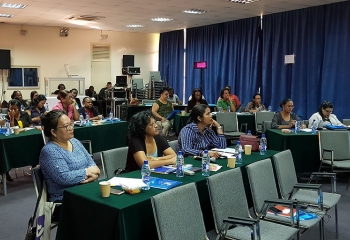There’s a new buzz in Guyana, which could help the government attain its development goals, and may boost entrepreneurship.
Known in the agricultural sector for its sugar and rice, the Government of Guyana, with support from the Caribbean Development Bank (CDB), is aiming to add honey to the list, and in the process, provide a sustainable pathway out of poverty for Guyanese.
Having wrapped up five days of training at the end of 2017, 25 new beekeepers have charged into the New Year eager about their prospects-some of them youth, launching businesses for the first time, some women, excited about the financial independence the industry can bring.
“I’ve always wanted to pursue an avenue that can help to supplement my family income, but was constrained by the lack of jobs in the area, having children to look after, and not having a skill I can utilise at home to earn,” said Sharon Butts, an unemployed, stay-at-home mother who participated in the workshop.

The course opened her eyes, she said, to the fact that she can use land resources her family already possesses to earn an income. Now Sharon has big plans for using her new skill, including establishing a small apiary.
“I will also work along with others who trained from my area to start a small beekeeping group and a honey house to be used for processing,” she said. “It is my dream to grow from a small apiary to one my family and I can eventually develop and pass on for generations to come.”
But why honey? Guyana’s apicultural industry is currently producing 11,300 gallons of the golden nectar annually, and by-products such as bees’ wax, pollen and royal jelly also contribute to the country’s gross domestic product (GDP). Demand is, however, greater than supply and Guyana imports over 4,000 gallons from markets such as Jamaica and the United States each year to make up the shortfall.
Imported honey is expensive, retailing at almost USD1.00 more than locally produced bottles. The solution, say officials, is to train more beekeepers.
“After eight years of growth, commodity prices collapsed for our major exports. But agriculture and natural resources remain significant sources of economic activity, and we are seeking alternative exports, honey being one, that not only grow GDP, but also adhere to our country’s Low Carbon Development Strategy, which promotes the vision of producing economic development while addressing climate change,” said Eusi Evelyn, Caribbean Technological Consultancy Services (CTCS) Network Project Liaison Officer, GCCI, Guyana.
The project aligns with CDB’s commitment to enhancing the managerial, technical and operational capacity of micro, small and medium-sized enterprises (MSMEs) in the Bank’s Borrowing Member Countries. CTCS-funded the workshop, which targeted vulnerable groups at risk for lower participation in available economic activities, including Amerindian communities, youth, women and people with disabilities.

“The technical assistance support CTCS provided is particularly worthwhile, given that beekeeping can be undertaken by the landless, requires limited infrastructure, and is an attractive venture for unemployed people,” said Lisa Harding, MSME Coordinator, Technical Cooperation Division, CDB.
“There is also great nutritional value in beehive products, and the potential for sustaining biodiversity, resulting in environmental stability is far-reaching,” she said. “The training activities will also position some MSMEs to transition from small-scale operations to large volume production, and take advantage of export opportunities when they arise.”

CTCS facilitates the transfer of knowledge and skills within the private sector by linking people who have business and technical experience with businesses that need consulting advice and assistance.
Some technical and marketing skills required for managing an apiary, and taught during the sessions included: fundamentals of starting an apiary, types of bee hives, conditions under which honey bee colonies thrive, harvesting techniques, and packaging and labeling techniques.




